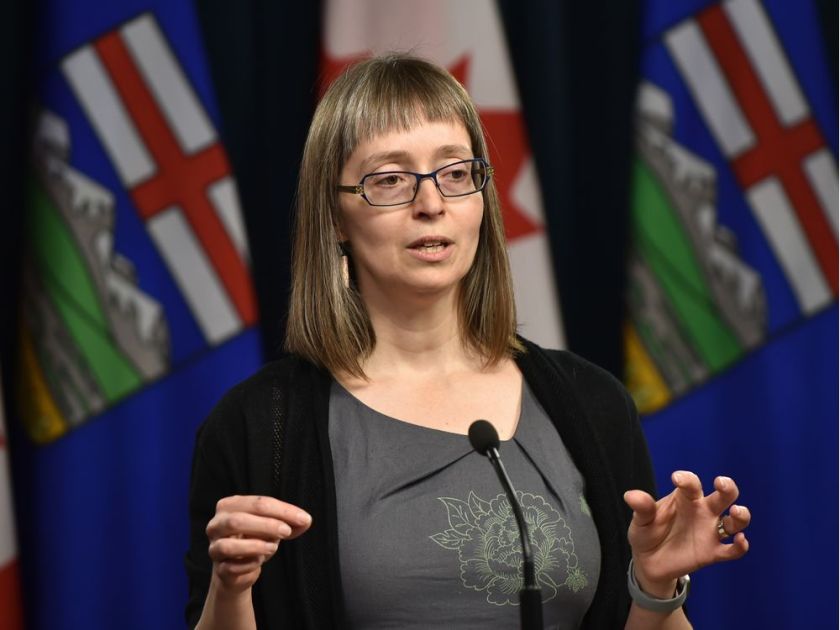Alberta’s chief medical officer of health, Dr. Deena Hinshaw answers questions about the novel coronavirus during a news conference at the Alberta legislature on Monday, Jan. 27, 2020.
Talk to almost any public health expert, and they’ll tell you — half-jokingly — that the only thing more virulent than the spread of an out-of-control virus is the spread of an out-of-control rumour about that virus.
In some cases, it’s not the bug, but an infectious case of public panic that proves to be the most dangerous pathogen.
As such, the World Health Organization’s declaration this week of novel coronavirus as a global health emergency — plus the confirmation of four Canadian cases — has undoubtedly helped to create a surge of interest and concern in our part of the world.
And while the risk to Albertans from coronavirus remains low, it can be hard to hold back speculation and anxiety once it gets going.
The only way to combat it is to provide good information, so here’s what I can offer.
It’s important to remember that Alberta has no cases, confirmed or probable. In case that changes, the province has a strong group of public health experts monitoring and preparing.
Fear is unhelpful. Precaution and preparation are far more useful, especially if that includes knowledge gleaned from official sources rather than what your aunt’s cousin’s former roommate might be stoking on social media.
That said, the day could eventually come when Alberta may have to contend with a surge of cases, even a pandemic. And in the event public anxiety becomes more justified, know that Alberta has a pandemic plan ready to implement.
I know this because I spent much of Friday reading through it.
Though chances are good we won’t have to use it any time soon, if it’s reassuring to you to know what it contains, then keep reading to learn some of the highlights.

A traveller wears a mask, after arriving on a direct flight from China, as Canada’s Public Health Agency added a screening question for visitors and began displaying messages in several airports urging travellers to report flu-like symptoms in efforts to prevent any introduction of coronavirus, at Vancouver International Airport in Richmond, British Columbia, Canada January 24, 2020.
REUTERS/Jennifer Gauthier
Overview:
The plan isn’t exactly the breezy read of a Chicken Soup book but does provide some comfort that the province has spent time and effort thinking about what to do, including the responsibilities of various agencies, likely effects on essential services and the variety of measures available to combat the outbreak.
Specific, detailed responses are largely absent, in part because it is impossible to map out every situation of how a pandemic might play out.
I do note one concern, which is that the plan’s last significant update was in early 2014, raising questions of relevance.
But Dr. Deena Hinshaw, chief medical officer of health, says the plan remains ready and was even practised last year to make sure.
Scenarios:
The plan considers four general scenarios ranging from a “mild” outbreak of low transmissibility and low virulence like the H1N1 flu of 2009, all the way to a “severe” pandemic like the Spanish flu of 1918 that killed 4,000 Albertans.
Communications:
The plan highlights the importance of government agencies working together to ensure “consistent messaging” to the public, and quickly establishing who will deliver that messaging.
Directing people to official websites seems to be the primary tool.
However, in part because the document is now six years old, it is largely silent on how to handle the sticky problem of social media, where bad information can incubate as quickly as a nasty infection.
It’s just an idea, but if Alberta can have a “war room” to defend the energy industry, why not another to immediately counter public health misinformation as soon as it’s discovered?
Tools:
A range of interventions are discussed, including the use of quarantines, isolation and social distancing, which would restrict where and when people can gather, and may include school or workplace closures.
Workplaces, particularly those that have to provide essential services such as food, fuel and communications, may have to implement controls. These could include installing physical barriers such as plexiglass, or forcing workers to wear masks.
In the health system, health workers may be asked to provide care outside of their normal duties and in buildings not normally used for health care.
Retired health workers, volunteers and students may even be called into service. The document notes that liability issues stemming from this will need to be considered.
Miscellaneous:
Alberta Health Services has an emergency stockpile of supplies such as gloves, masks and syringes. It also includes bodybags.
Should a pandemic produce mass fatalities that overwhelm AHS and the medical examiner, special procedures can be implemented including streamlining death certificates and reducing the use of autopsies.
The document also notes that a pandemic will increase the need for psychosocial supports, including mental health interventions and help for vulnerable Albertans who have lost their support network.
Vaccine:
No vaccine is available for coronavirus. Should one be created, the plan offers no details on which groups will be given priority, saying only that it will be dependent on the “specific virus situation.”
The overall goal is for the health system to have the capacity to deliver the first dose of vaccine to all Albertans who want it within a month.
Ethics:
When is it appropriate to keep someone in isolation, or quarantine an entire community?
What are the expectations for health workers between continuing to work and caring for their own loved ones?
Should families be banned from visiting their relatives in hospitals or long-term care centres?
To help with these calls, the province in 2016 actually created an “ethical framework” of principles that should be considered in decision-making: balancing personal choices with situational reality, taking into account all relevant views and evidence, and deploying resources fairly.






















